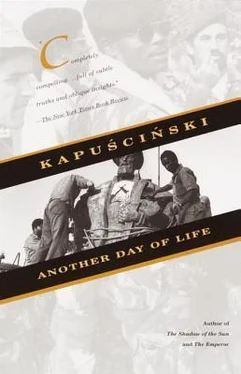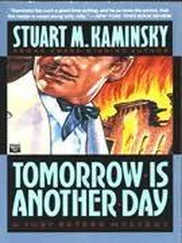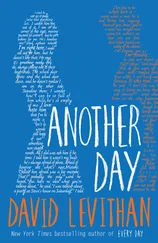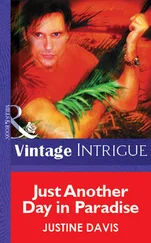But let’s say that fortune has smiled on us this time. We have announced ourselves with camarada in a voice strangled and hoarsened by fear. The word has been enunciated in such a way that some sort of sound will reach the people at the checkpoint, but not an overly distinct, overly literal, and irrevocable sound: Our mumbling, into which we have cautiously smuggled the fragile syllables of the word camarada, will thus leave us with a loophole, a chance of reversing, of retreating into the word irmão, so that the unhappy confusion of words can be blamed on the hellish heat that dulls and addles the mind, on the exhaustion of travel, and the nervousness understandable in anyone who finds himself at the front. This is a delicate game; it demands skill, tact, and a good ear. Any taking the easy way out, any heavy-handedness, shows immediately. We can’t, for instance, shout “Camarada! Irmão!” all at once, unless we want to be regarded — and rightly so — as the kind of opportunists who are scorned in front-line situations all over the world. We will arouse their suspicion and be held for interrogation.
So we have said “Camarada!” and the faces of the people from the checkpoint brighten. They answer “Camarada!” Everybody begins repeating “Camarada! Camarada!” sportively and loudly an unending number of times as the word circulates between us and the sentries like a flock of doves.
The euphoria that sweeps over us at the thought that we will live does not last long, however. We will live, but whether we will continue our journey is still an open question. So we proceed to the first, explanatory part of the meeting. We tell who we are, where we are headed, and where we are coming from. At exactly this moment we present our pass. Troubles arise if the sentry can’t read — an epidemic problem in the case of peasant and nomad sentries. The better-organized checkpoints employ children to this end. Children know how to read more often than adults, because schools have begun to develop only in the last few years. The contents of a general staff pass are usually warm and friendly. They state that Camarada Ricardo Kapuchinsky is our friend, a man of good will, reliable, and all camaradas at the front and in the rear are therefore asked to show him hospitality and assist him.
Despite such a positive recommendation, the people from the checkpoint begin as a rule by saying that they don’t want us to go on and order us to turn back. This is understandable. True, the authority of Luanda is great — but then, doesn’t the checkpoint also constitute authority? And the essence of authority is that it must manifest its power.
But let’s not give up hope or become dispirited! Let’s reach into the arsenal of persuasion. A thousand arguments speak in our favor. We have our documents in order: There is the text, the stamp, and the signature. We know President Agostinho Neto personally. We know the front commander. We are writing dispatches, we are making Angola and its champions of right famous around the world. The bad Europeans have decamped and whoever stayed must be on their side or he wouldn’t have stuck it out. Finally: Search us — we have no weapons, we can’t harm anybody.
Slowly, stubbornly, the sentries yield. They talk it over, they confer off to one side, and sometimes a quarrel breaks out among them. They can send a message to their commander, who has driven to the city or set out for a village. Then we have to wait. Wait and wait, which we spend our whole life here doing. But this has its good side, since shared waiting leads to mutual familiarity and closeness. We have already become a particle of the checkpoint society. If there is time and interest, we can tell them something about Poland. We have a sea and mountains of our own. We have forests, but the trees are different: There isn’t a single baobab in Poland. Coffee doesn’t grow there, either. It is a smaller country than Angola, yet we have more people. We speak Polish. The Ovimbundi speak their own language, the Chokwe speak theirs, and we speak ours. We don’t eat manioc; people in Poland don’t know what manioc is. Everybody has shoes. You can go barefoot there only in the summer. In winter a barefoot person could get frostbite and die. Die from going barefoot? Ha! Ha! Is it far to Poland? Far, but close by airplane. And by sea it takes a month. A month? That’s not far. Do we have rifles? We have rifles, artillery, and tanks. We have cattle just like here. Cows and goats, not so many goats. And haven’t you ever seen a horse? Well, one of these days you’ll have to see a horse. We have a lot of horses.
The time passes in agreeable conversation, which is exactly the way the sentries like it. Because people rarely dare to travel now. The roads are empty and you can go days without seeing a new face. And yet you can’t complain of boredom. Life centers around the checkpoints these days, as in the Middle Ages it centered around the church. The local marketwomen set out their wares on scraps of linen: meaty bananas, hen’s eggs as tiny as walnuts, red pili-pili, dried corn, black beans, and tart pomegranates. Clothing-stall owners sell the cheapest garments, garish scarves, and also wooden combs, plastic stars, pocket mirrors with the likenesses of known actresses on the back, rubber elephants, and fifes with keys that move. Any children not on active duty play in homespun shirts in the neighboring fields. You can encounter village women with clay jugs on their heads on their way to get water, walking from who knows where to who knows where.
The checkpoint, if composed of friendly people, is a hospitable stopping place. Here we can drink water and, sometimes, purchase a couple of liters of gasoline. We can get roast meat. If it’s late, they let us sleep over. At times they have information about who controls the next stretch of road.
The time to leave approaches, and the sentries go to work. They open the road — they roll away the drums, push away the stones, move the wardrobe. And afterward, when we’re about to drive off, they walk up to us with the one universally repeated question: Do we have any cigarettes?
Then there is a momentary reversal of roles. Authority passes into our hands because we, not they, have cigarettes. We decide whether they get one, two, or five cigarettes. Our sentries put down their weapons and wait obediently and patiently, with humility in their eyes. Let’s be human about it and share evenly with them. They’re in a war, fighting and risking their lives. Once the cigarettes are bestowed on them, they raise their hands in the victory sign, smile — and among shouts of “Camarada! Camarada!” we set out along the road into the unknown, into the empty world, into the mad, white scorching heat, into the fear that awaits us at the next checkpoint.
Roving thus from checkpoint to checkpoint, in an alternating rhythm of dread and joy, I reached Benguela. The road from Luanda to Benguela passes through six hundred kilometers of desert terrain, flat and nondescript. A haphazard medley of stones, frumpy dry bushes, dirty sand, and broken road signs creates a gray and incoherent landscape. In the rainy season the clouds churn right above the ground here, showers drag on for hours, and there is so little light in the air that day might as well not exist, only dusk and night. Even during heat waves, despite the excess of sun, the countryside resembles deserted, burned-out ruins: It is ashy, dead, and unsettling. People who must travel through here make haste in order to get the frightening vacancy behind them and arrive with relief at their destination, the oasis, as quickly as possible. Luanda is an oasis and Benguela is an oasis in this desert that stretches all along the coast of Angola.
Читать дальше











